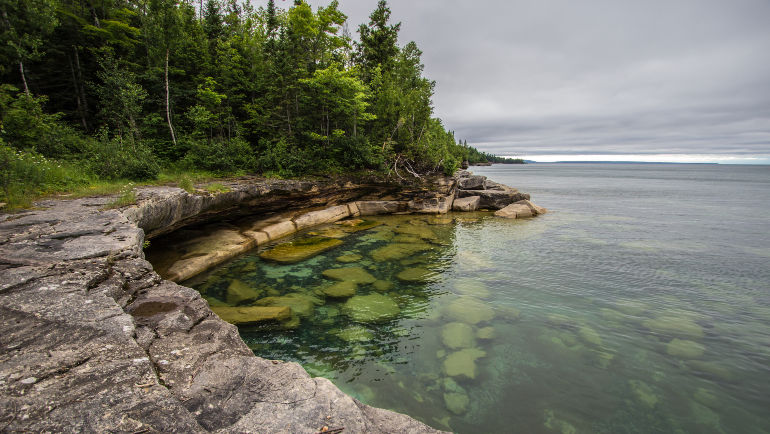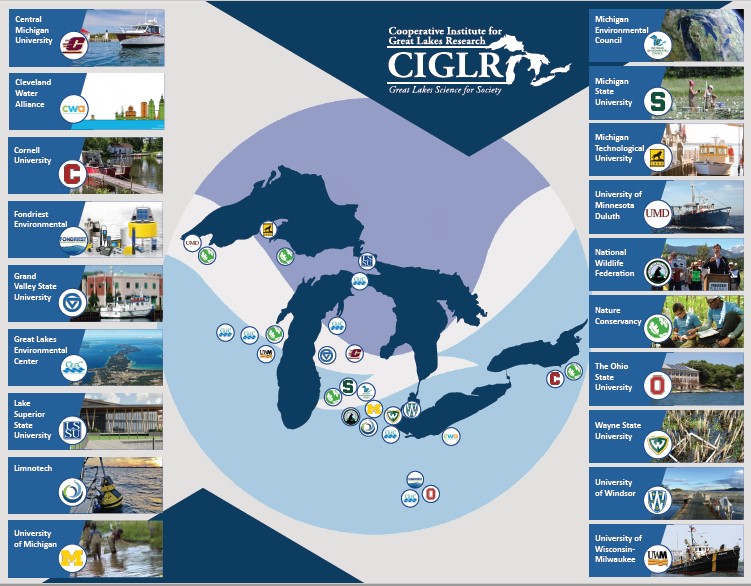
Wayne State University is one of four of the newest partners announced for the Cooperative Institute for Great Lakes Research’s Regional Consortium (CIGLR) at the University of Michigan. This cooperative will offer expertise to understand, predict, and ultimately solve the critical issues facing the Great Lakes and surrounding communities. With the addition of these new partner organizations, the CIGLR Regional Consortium consists of twelve universities, four NGOs, and three businesses who partner with the National Oceanic and Atmospheric Administration (NOAA) in research and development activities that support NOAA’s mission in the Great Lakes.
The other new partners are Cleveland Water Alliance, Lake Superior State University, and Michigan Technological University. These institutions were selected for membership because each brings a critical new element to the Regional Consortium.
“I am excited about the new era of sustainable resource management that is being built right now – an era that is based on partnerships among great organizations who work together for the good of all who call the Great Lakes their home,” said CIGLR Director, Dr. Brad Cardinale.
Wayne State’s partnership will offer expertise in invasive species, environmental health, environmental law and policy, and urban water and wastewater infrastructure that will bring a unique set of skills to the Regional Consortium. The proposal from Wayne State was led by Donna Kashian, Ph.D., associate professor of biological sciences in the College of Liberal Arts & Sciences, and Carol Miller, Ph.D., professor of civil and environmental engineering in the College of Engineering.
"Wayne State looks forward to growing our Great Lakes research program through a partnership with CIGLR and its partners, providing novel collaborative research opportunities for our diverse faculty and student body,” said Kashian. “We are confident that this partnership will significantly expand the depth and reach of CIGLR and NOAA, while also expanding the WSU Great Lakes profile.”
Key to Wayne State’s partnership with CIGLR will be an innovative graduate training program known as the Transformative Research in Urban Sustainability Training, or T-RUST. T-RUST integrates social and physical science, technology, engineering and mathematics in an effort to tackle complex challenges in urban sustainability. It will train students using integrated scientific, engineering and social science approaches combined with innovative policy-making in an effort to foster innovation in urban sustainability.

The Healthy Urban Waters project at Wayne State will also play a key role in the partnership with CIGLR. Healthy Urban Waters is a program at Wayne State that promotes and delivers research, education, technology development and public engagement on water resources in the urban environment. The focus area is the Huron to Erie corridor, although the university’s expertise and application extends throughout the Great Lakes watershed. The Healthy Urban Water’s mission to engage and empower the public in creating a sustainable urban environment based on sound science will be an excellent complement to CIGLR.
Wayne State’s Water and Health Infrastructure Resilience and Learning (WHIRL) project is another program that will offer expertise to the consortium. The WHIRL team of researchers is working to understand how drinking water and public health are connected. To do this, they aim to assess threats to water safety and learn what happens when access to clean water is disrupted. It also is evaluating how the public engages with drinking water and public health systems with the goal of speeding up the use of information that may be used to help reduce risk.
Another vital program that will be key to the consortium is Wayne State’s Center for Urban Responses to Environmental Stressors, or CURES. CURES researchers are evaluating chronic, low-level exposure to environmental stressors including water pollution that can lead to adverse health conditions and disease. This team of researchers aims to prevent disease through community awareness and public policy change.
CIGLR’s Regional Consortium members partner with scientists at NOAA’s Great Lakes Environmental Research Laboratory to tackle important issues facing the Great Lakes. The Regional Consortium adds geographic breadth, technical capabilities, and cutting-edge facilities to amplify the capacity of the Ann Arbor, Michigan-based government lab.
“We welcome the new CIGLR partners and look forward to new opportunities for collaboration. As the consortium grows, so does NOAA’s research capacity in the Great Lakes basin,” said Debbie Lee, director of the NOAA Great Lakes Environmental Research Laboratory.
Hosted by the School for Environment and Sustainability at the University of Michigan, CIGLR is one of 16 NOAA-funded Cooperative Institutes across the United States. With the Regional Consortium and a Research Institute embedded with the NOAA Great Lakes Environmental Research Laboratory, CIGLR partners closely with NOAA to achieve environmental, economic, and social sustainability in the Great Lakes.
About Wayne State University Research
Wayne State University is one of the nation’s pre-eminent public research universities in an urban setting. Through its multidisciplinary approach to research and education, and its ongoing collaboration with government, industry and other institutions, the university seeks to enhance economic growth and improve the quality of life in the city of Detroit, state of Michigan and throughout the world. For more information about research at Wayne State University, visit research.wayne.edu.
